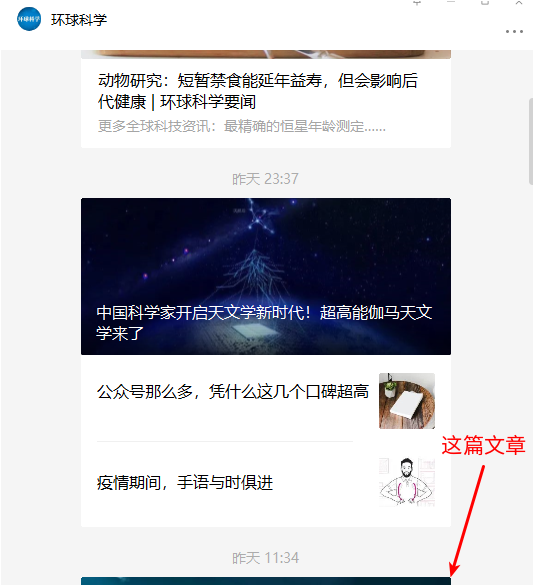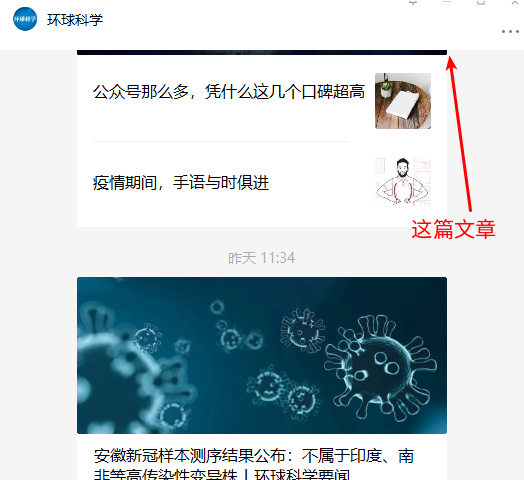以往我们接触到的爬虫都是在浏览器进行数据爬取的,但是现在有很多的优质内容都是在公众号里的(其他应用也有类似公众号的操作),在公众号内的内容是不能被浏览器直接访问的,也不能被爬虫爬取(所以他们也不做seo),这些优质内容就是这个网站的优良生态,但是我们还是很想要这些内容怎么办?有两种方法,一种是使用抓包的方式抓取手机请求数据,然后通过一系列操作(详情参考手机爬虫)获得想要的数据,然而这种方式需要解密,难度比较高,所以我们可以选择另一种方法——pywinauto驱动微信客户端实现公众号爬虫。
项目地址
https://github.com/fancyerii/wechat-gongzhonghao-crawler
pywinauto简介
pywinauto是一个python的工具,可以用于控制Windows的GUI程序。详细的文档可以参考这里。
WechatAutomator类
自动化微信的代码封装在了类WechatAutomator里,完整的代码可以参考这里。这里简要的介绍一下其中的主要方法:
init_window
这个方法完成类的初始化,它的代码为:
def init_window(self, exe_path=r"C:Program Files (x86)TencentWeChatWeChat.exe",
turn_page_interval=3,
click_url_interval=1,
win_width=1000,
win_height=600):
app = Application(backend="uia").connect(path=exe_path)
self.main_win = app.window(title=u"微信", class_name="WeChatMainWndForPC")
self.main_win.set_focus()
self.app = app
self.visible_top = 70
self.turn_page_interval = turn_page_interval
self.click_url_interval = click_url_interval
self.browser = None
self.win_width = win_width
self.win_height = win_height
# 为了让移动窗口,同时使用非uia的backend,这是pywinauto的uia的一个bug
self.app2 = Application().connect(path=exe_path)
self.move_window()我们首先来看函数的参数:
- exe_path
- 微信程序的地址
- turn_page_interval
- 抓取翻页时的时间间隔,默认3s
- click_url_interval
- 在抓取一页的url时的间隔,默认1s
- win_width
- 设置窗口的宽度
- win_height
- 设置窗口的高度,如果显示器的分辨率较大,可以设置的更加高一些,从而一页包含的文章数更多一些,从而翻页少一点。注意:一定要保证窗口完全可见,也就是说win_height不能大于实际分辨率的高度!
这个函数的主要功能是构建Application对象从而通过pywinauto实现控制,这里使用的是uia的backend,然后设置窗口的大小并且把窗口移到最左上角。因为根据so文章,pywinauto 0.6.8存在bug,只能通过win32的backend来移到窗口,所以构造了self.app2然后调用move_window()函数把窗口移到最左上角。
crawl_gongzhonghao
这个函数实现了某个公众号的文章抓取。它的基本控制逻辑如下:
- 首先通过搜索框根据名字搜索公众号并且点击它。
- 对于当前页点击所有的链接并且下载其内容。
- 使用PAGE_DOWN键往下翻页
- 需要判断是否继续抓取
第一个是通过locate_user函数实现,后面会介绍。第二个是通过process_page函数实现,后面也会介绍。判断是否继续抓取的逻辑为:
- 如果翻页超过max_pages,则停止抓取
- 如果碰到某个url曾经抓取过,那说明之前的文章都已经抓取过了,则停止抓取
- 如果lastest_date不是None并且一篇文章的发布日期早于它,则停止抓取
所以我们通常会在第一次抓取的时候把max_pages设置的很大(比如100),然后通过latest_date来抓到指定的日期。而之后的抓取则设置max_pages为较小的值(比如默认的6),这样只要爬虫在两次抓取之间公众号的更新不超过6页,那么就不会漏掉文章。具体的逻辑可以参考main.py,它会把抓取的文章通过http请求发给Server,并且每次抓取的时候从Server查询抓取过的文章存放到states这个list里states[i][“url”]就存储了第i篇文章的url。
def crawl_gongzhonghao(self, account_name, articles, states, detail,
max_pages=6, latest_date=None, no_item_retry=3):
logger.debug(account_name)
if not self.locate_user(account_name):
return False
last_visited_titles = set()
visited_urls = set()
self.turn_page_up(min(20, max_pages * 2))
pagedown_retry = 0
last_visited_titles = []
for page in range(0, max_pages):
items = []
last_visited_titles = self.process_page(account_name, items, last_visited_titles, states, visited_urls, detail)
articles.extend(items)
if len(items) == 0:
pagedown_retry += 1
if pagedown_retry >= no_item_retry:
s = "break because of retry {}".format(pagedown_retry)
logger.debug(s)
WechatAutomator.add_to_detail(s, detail)
break
else:
pagedown_retry = 0
if len(items) > 0 and latest_date is not None:
html = items[-1][-1]
pub_date = WechatAutomator.get_pubdate(html)
if pub_date and pub_date < latest_date:
s = "stop because {} < {}".format(pub_date, latest_date)
logger.debug(s)
WechatAutomator.add_to_detail(s, detail)
break
url_exist = False
for item in items:
if WechatAutomator.url_in_states(item[0], states):
s = "stop because url exist {}".format(item[0])
logger.debug(s)
WechatAutomator.add_to_detail(s, detail)
url_exist = True
break
if url_exist:
break
self.click_right()
self.main_win.type_keys("{PGDN}")
time.sleep(self.turn_page_interval)
self.turn_page_up(page * 2)
return Truelocate_user
locate_user函数的控制流程为:
- 找到左上角的搜索框并且点击它获得焦点
- 使用ctrl+a选中可能有的文字(之前的bug?)并且使用后退键删除它们
- 输入公众号名称
- 在弹出的list里点击这个公众号名称从而进入公众号
def locate_user(self, user, retry=5):
if not self.main_win:
raise RuntimeError("you should call init_window first")
search_btn = self.main_win.child_window(title="搜索", control_type="Edit")
self.click_center(search_btn)
self.main_win.type_keys("^a")
self.main_win.type_keys("{BACKSPACE}")
self.main_win.type_keys(user)
for i in range(retry):
time.sleep(1)
try:
search_list = self.main_win.child_window(title="搜索结果")
match_result = search_list.child_window(title=user, control_type="ListItem")
self.click_center(match_result)
return True
except:
pass
return False这里主要就是通过child_window函数进行定位,关于它的用法这里不介绍。关于怎么定位元素的方法可以使用Inspect.exe或者print_control_identifiers函数,具体参考这里。
process_page
这个函数是最主要的抓取代码,它处理当前一页的内容,它的控制流程如下:
- 构建当前页的tree
- 使用recursive_get函数遍历这颗树并且找到每篇文章对应的element
- 遍历每一篇文章
- 如果文章的名字在上一页出现过,则跳过
- 获得这篇文章的坐标信息
- 如果文章不可见(rect.top >= win_rect.bottom or rect.bottom <= self.visible_top)则跳过
- 计算点击的坐标
- 点击文章打开新的窗口
- 在新的窗口中点击【复制链接】按钮
- 从剪贴板复制链接url
- 通过url下载文章内容并且parse发布日期
逻辑比较简单,但是有一些很trick的地方:
- 微信翻页的实现
- 微信客户端的翻页和浏览器不同,它的内容是累加的,比如第一页3篇文章,往下翻一页可能变成6篇文章,再翻可能变成9篇。这个时候这9篇文章都是在tree中的,只不过最后3篇的坐标(top和bottom)是空间的。
- 能否点击 一篇文章对应的框(图)可能是部分可见的,甚至它的top非常接近屏幕的最下方,这个时候可能点不了。如下图所示:

与此类似的是右上角的黑色头部(不能滚到并且会遮挡)也有一定空间,如下图所示:

- 点击的位置
因为这个框可能很窄(bottom-top很小)并且可能在很靠上或者靠下的位置。所以有如下代码:
# 计算可见的高度
visible_height = min(rect.bottom, win_rect.bottom) - max(rect.top, win_rect.top+self.visible_top)
# 太窄的不点击,希望下次翻页后能显示更多像素从而可以点击,
# 但是如果微信的某个文章的框的高度小于10个像素,那么这篇文章就无法被点击
# 不过作者目前为发现这么窄的文章
if visible_height < 10:
continue
# 如果某个文章的框太大,则抛出异常,目前为止为发现这样的问题。
if rect.bottom - rect.top >= win_rect.bottom - self.visible_top:
raise RuntimeError("{}-{}>={}-{}".format(rect.bottom, rect.top,
win_rect.bottom, self.visible_top))
# 如果下部部分可见,那么点击上方是比较”安全“的
if rect.bottom >= win_rect.bottom:
click_up = True
# 如果下部完全可见,则点击下方是”安全“的
else:
click_up = False完整代码如下:
def process_page(self, account_name, items, lastpage_clicked_titles, states, visited_urls, detail):
clicked_titles = set()
text = self.main_win.child_window(title=account_name, control_type="Text", found_index=0)
parent = text
while parent:
parent = parent.parent()
if '会话列表' == parent.element_info.name:
break
paths = [0, 2, 0, 0, 0, 1, 0]
for idx in paths:
parent = parent.children()[idx]
elems = []
self.recursive_get(parent, elems)
win_rect = self.main_win.rectangle()
for elem in elems:
rect = elem.rectangle()
if elem.element_info.name in lastpage_clicked_titles:
continue
if rect.top >= win_rect.bottom or rect.bottom <= self.visible_top:
continue
visible_height = min(rect.bottom, win_rect.bottom) - max(rect.top, win_rect.top+self.visible_top)
if visible_height < 10:
continue
if rect.bottom - rect.top >= win_rect.bottom - self.visible_top:
raise RuntimeError("{}-{}>={}-{}".format(rect.bottom, rect.top,
win_rect.bottom, self.visible_top))
if rect.bottom >= win_rect.bottom:
click_up = True
else:
click_up = False
if self.is_bad_elem(elem):
s = "not good elem {}".format(elem.element_info.name[0:10])
logger.debug(s)
WechatAutomator.add_to_detail(s, detail)
continue
try:
self.click_url(rect, win_rect, click_up)
copy_btn = self.browser.child_window(title="复制链接地址")
self.click_center(copy_btn, click_main=False)
url = clipboard.GetData()
if elem.element_info.name != '图片':
clicked_titles.add(elem.element_info.name)
if url and not url in visited_urls:
visited_urls.add(url)
html = None
try:
html = requests.get(url).text
except:
s = "fail get {}".format(url)
logger.debug(s)
WechatAutomator.add_to_detail(s, detail)
items.append((url, rect, elem.element_info.name, html))
except:
traceback.print_exc()
pass
finally:
if self.browser:
try:
self.browser.close()
except:
pass
self.browser = None
time.sleep(self.click_url_interval)
return clicked_titles以上就是python使用pywinauto驱动微信客户端实现公众号爬虫的详细内容,更多关于python 公众号爬虫的资料请关注W3Cschool其它相关文章!


